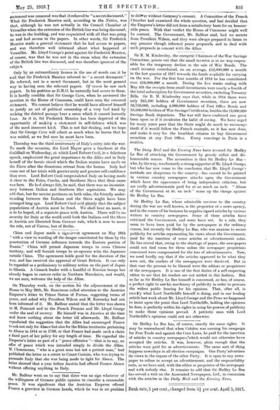On Thursday week, on the motion for the adjournment of
the House to May 28th, Mr. Runciman called attention to the Austrian Emperor's letter to Prince Sixtus of Parma, suggesting terms of peace, and asked why President Wilson and M. Kerenaky had not. been informed of it. Mr. Balfour stated that the letter was shown to M. Poineare and to the French Premier and Mr. Lloyd George under the seal of secrecy. He himself was in America at the time and knew nothing about the letter till afterwards. Mr. Balfour repudiated the suggestion that the Allies bad encouraged France to ask not only for Alsace but also for the Rhine territories pertaining to Alsace in 1814 or in 1790, or that France had made such a claim a fixed part of her policy for any length of time. He regarded the Emperor's letter as part of a " peace offensive "—that is to say, an offer of peace which was intended simply to divide the Allies. M. Clemenceau, " who is a great man but not a patient man," had published the letter as a retort to Count Czernin, who R as trying to persuade Italy that she was being made to fight for Alsace. The letter showed that a year before Austria had offered France Alsace without offering anything to Italy.


























 Previous page
Previous page